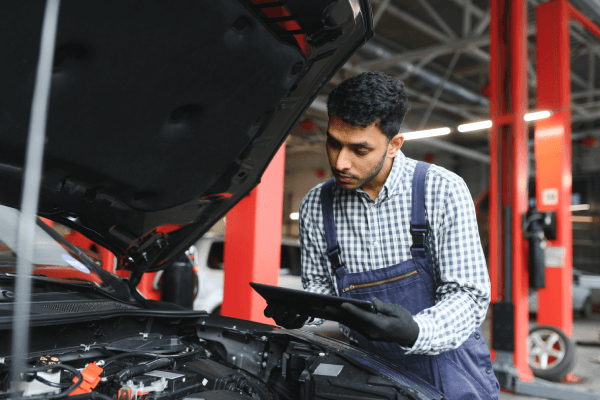Picture this: you’re juggling work, errands, and maybe even a kid’s soccer practice, and your car’s dashboard is flashing that pesky service light. You know it’s time to get it checked, but one question looms large—how long does a car service take? If you’re like me, you’re already wondering how to fit this into your packed schedule. Don’t worry, I’ve got you covered with a breakdown of what to expect, based on real-world insights and a sprinkle of practical advice. Let’s dive in!
What Exactly Is a Car Service?

Before we talk about timing, let’s clarify what a car service involves. A car service is like a health check-up for your vehicle. It’s a routine maintenance session to keep your engine humming, tires rolling, and brakes stopping on a dime. Depending on your car’s make, model, and mileage, a service might include:
- Oil and filter changes
- Tire rotations and pressure checks
- Brake inspections
- Fluid top-offs (coolant, windshield wiper fluid, etc.)
- Checking belts, hoses, and other under-the-hood essentials
There are different types of services—basic, interim, full, or major—and each takes a different amount of time. The kind of service, along with a few other factors, determines how long you’ll be waiting at the shop (or sipping coffee at a nearby café).
How Long Does a Basic Car Service Take?
A basic car service is the quickest of the bunch, typically recommended every 5,000 to 7,500 miles or six months. Think of it as a pit stop for your car. It usually includes an oil change, a new oil filter, and a quick once-over to ensure nothing’s glaringly wrong.
Time estimate: 30 minutes to 1 hour
If you’re heading to a quick-lube shop or a dealership with an express lane, you’re often in and out in under an hour. I’ve had my oil changed in about 45 minutes at a local chain while scrolling through my phone in the waiting area. Pro tip: these places thrive on speed, so they’re a great choice if you’re in a hurry. Just make sure they’re using the right oil for your car—check your owner’s manual to avoid any mix-ups.
What About an Interim or Full Service?
An interim service is a step up, often suggested every 12,000 miles or annually. It’s more thorough, covering things like air filter replacements, fluid checks, and a deeper inspection of brakes and suspension. A full service is even more comprehensive, diving into every nook and cranny of your vehicle to ensure it’s in tip-top shape.
- Interim service time estimate: 1 to 2 hours
- Full-service time estimate: 2 to 3 hours
Last year, I took my sedan for a full service at a trusted local mechanic. It took about 2.5 hours, but I was impressed by how they walked me through the checklist afterward, pointing out a slightly worn belt that needed replacing soon. If your mechanic’s shop is busy or they spot something that needs extra attention (like a leaky gasket), it could push the time closer to three hours. My advice? Call ahead and ask for a time estimate based on your car’s needs.
Major Services: The Long Haul
A major service is a big kahuna, typically recommended every 24,000 miles or two years. This is where mechanics roll up their sleeves and check everything—from spark plugs to timing belts to transmission fluid. It’s like a full-body scan for your car, designed to catch issues before they leave you stranded.
Time estimate: 3 to 5 hours
I’ll be honest: a major service can feel like a commitment. The last time I had one done, I dropped my car off in the morning and picked it up after lunch. Some shops might even keep your car for a full day if they’re replacing major components like a timing belt or water pump. If you’re planning for this, ask if they offer a loaner car or a shuttle service—some dealerships do, and it’s a lifesaver.
What Can Affect the Time?
No two car services are exactly alike, and a few variables can stretch (or shrink) the timeline:
- Type of vehicle: A compact sedan is usually quicker to service than a luxury SUV or a high-performance car with complex systems. My friend with a tricked-out sports car swears his services take forever because of all the custom parts.
- Service center: Dealerships might take longer due to their thorough processes, while independent mechanics can sometimes be faster (or slower, depending on their workload). Chains like Jiffy Lube prioritize speed for basic services.
- Unexpected repairs: If the mechanic finds an issue—like worn brake pads or a faulty sensor—repairs will add time. This happened to me once when a routine service uncovered a cracked hose, taking on an extra hour.
- Appointment vs. walk-in: Booking ahead can save time, as walk-ins might wait longer if the shop is busy. I learned this the hard way when I showed up without an appointment and spent an extra 45 minutes twiddling my thumbs.
Tips to Save Time (and Your Sanity)
Want to make your car service as quick and painless as possible? Here are a few tricks I’ve picked up:
- 1. Schedule early in the day: Shops are often less busy first thing in the morning, so you’re more likely to get in and out quickly.
- 2. Be specific about your needs: Tell the shop exactly what you want (e.g., “just an oil change” or “full service with tire rotation”). This helps them prioritize and avoid unnecessary checks.
- 3. Ask for a time estimate upfront: When you book, ask how long the service will take based on your car’s make and model. It sets clear expectations.
- 4. Consider mobile mechanics: Some services, like oil changes, can be done at your home or workplace, saving you the trip to the shop. I tried this once, and it was a game-changer—no waiting room required!
- 5. Check for express options: Many dealerships and chains offer “express service” lanes for quick jobs like oil changes or tire rotations.
Why the Wait Is Worth It
I get it—nobody loves sitting around waiting for their car. But regular servicing is like brushing your teeth: skip it, and you’ll regret it later. A well-maintained car runs better, lasts longer, and saves you from costly repairs down the road. Plus, it’s a chance to catch small issues before they turn into big headaches. That time I ignored my service light. Let’s just say a $200 repair turned into a $1,200 nightmare.
Wrapping It Up
So, how long does a car service take? It depends on the type of service and a few other factors, but here’s a quick recap:
- Basic service: 30 minutes to 1 hour
- Interim service: 1 to 2 hours
- Full service: 2 to 3 hours
- Major service: 3 to 5 hours (or more)
Your best bet is to plan, book an appointment, and ask your mechanic for a time estimate tailored to your car. That way, you can sip your coffee, catch up on emails, or even sneak in a quick nap while your car gets the TLC it deserves. Got a service coming up? Let me know in the comments how you pass the time at the shop—I’m always looking for new ideas!






